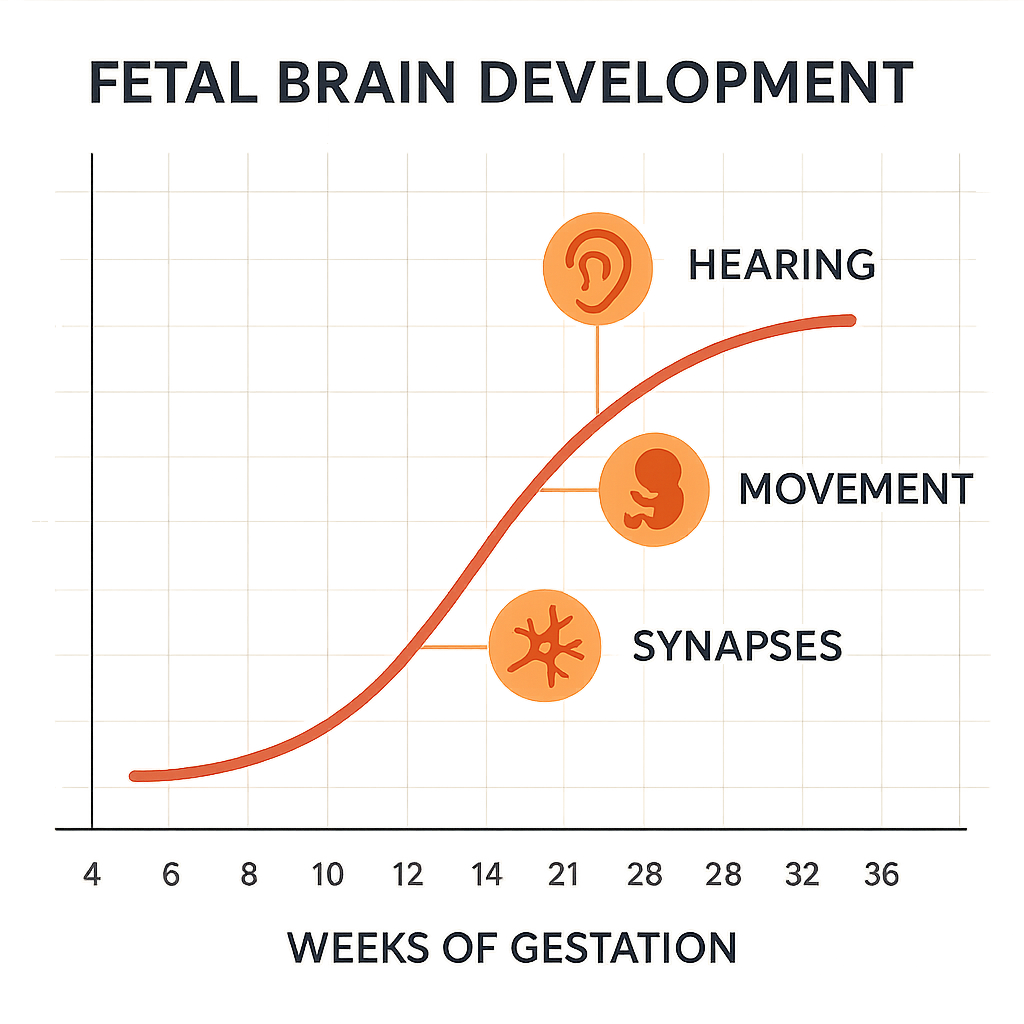Your baby’s brain is already preparing to learn, even before taking their first breath. This remarkable process begins in the womb, where billions of neural connections form, setting the stage for memory, language, and sensory skills. Understanding how your baby’s brain and hearing develop can help you support their growth from pregnancy onward. Let’s explore how this happens and why it’s so important.
- How does a fetus’s brain get ready to learn before birth?
- When can your unborn baby actually hear—and why does timing matter?
- What does research say about talking and singing boosting brain power?
- Does prenatal talking make babies smarter or just language-ready?
- How loud, how often, and what type of sound is safe?
- What practical steps can parents take to use voice and music effectively?
- Which myths about prenatal sound stimulation should you ignore?
- Do nutrition, stress, and lifestyle outweigh talking and singing?
- Table: Holistic Factors for Fetal Brain Development
- What are parents’ top questions about prenatal talking, singing, and brain development?
- Where can I read the key studies myself?
- Final Thoughts
How does a fetus’s brain get ready to learn before birth?
The fetal brain starts building the foundation for learning early in pregnancy. By 5-7 weeks, the first synapses—connections between neurons—begin forming in the spinal cord, marking the onset of brain activity as in Zero to Three. This early development is critical for cognitive functions like memory and language.
-
Synapse Surge: Between 28 and 32 weeks, the brain forms billions of neural connections daily, creating a robust network for sensory processing and learning as per NCBI Bookshelf. These connections, involving structures like the hippocampus, support skills such as recognizing sounds or movements.
-
Early Reflexes: Around 24-25 weeks, fetuses show a blink-startle response to loud noises, indicating that sensory pathways, including those for hearing, are activating. See EHD.org. This reflex relies on the seventh and eighth cranial nerves, showing the brain’s growing responsiveness.
-
Ongoing Growth: The brain continues refining neural networks through the third trimester, preparing for complex tasks post-birth, like language acquisition and sensory integration.
These milestones highlight the brain’s rapid preparation for learning. For more on post-birth development, see Why the First 3 Years Are Critical for Your Baby’s Brain.

When can your unborn baby actually hear—and why does timing matter?
Fetuses begin hearing consistently around 23-25 weeks, with significant auditory development by 30 weeks. Early hearing starts with low-frequency sounds, like a mother’s heartbeat, and progresses to speech frequencies, setting the stage for language learning.
- 18-22 Weeks: Fetuses detect faint, low-frequency sounds (250–500 Hz), such as maternal heartbeats or digestive noises as noted in BabyCenter.
Supporting Your Baby’s Brain and Hearing Development
Parents can actively support their baby’s development before birth. Here are actionable steps:
- Talk and Sing: Engage with your baby by talking or singing daily. Your voice is the clearest sound your baby hears in the womb, and they can recognize it after birth; according to What to Expect.
- Read Aloud: Reading nursery rhymes or stories exposes your baby to language rhythms and patterns, aiding early language acquisition. For example, try “Twinkle Twinkle Little Star” or “Humpty Dumpty.”
- Play Soft Music: Gentle music or lullabies provide soothing auditory stimulation. Avoid loud noises, as they can stress both you and your baby as noted in CDC.
- Monitor Noise Levels: Limit exposure to loud environments, as excessive noise can interfere with the developing auditory system. Sounds above 115 dBA, like a chainsaw, should be avoided.
Pro Tip: Establish a daily routine of reading or singing the same nursery rhyme. Studies, such as one from the University of Helsinki, show that fetuses can recognize repeated melodies, enhancing cognitive development as highlighted in PLOS One.
Curious how those tags shape later learning? Explore How Your Baby’s Brain Learns.
What does research say about talking and singing boosting brain power?
A 2023 meta-analysis of eight randomized controlled trials, involving 535 newborns confirmed that exposure to prenatal sounds creates lasting memory traces. Newborns who were exposed to repeated speech or music in utero exhibited stronger EEG responses, faster habituation to sounds, and more stable heart-rate patterns.
Key studies include one from the University of Barcelona in 2023showed that daily music exposure in the last trimester enhanced the frequency-following response by 25%, indicating better neural tuning to speech sounds.
Another study demonstrated that babies who heard the melody “Twinkle, Twinkle, Little Star” 171 times before birth could still recognize it four months later, as evidenced by brain scan differences. See Prenatal Music Exposure.
These gains reflect neural plasticity and auditory fine-tuning, the bedrock for later language and emotional bonding.
Does prenatal talking make babies smarter or just language-ready?
While talking and singing to your baby in utero helps prepare their brain for language, it does not directly increase IQ scores. Long-term studies following children up to age 7 have not found a significant increase in IQ solely from prenatal sound exposure. However, these children do show advanced speech-sound discrimination, often recognizing sounds two to four weeks earlier than their peers, and they tend to have better emotional regulation.
For a deeper myth check, visit Boosting Baby IQ: 5 Myths Debunked and Proven Facts.
How loud, how often, and what type of sound is safe?
To ensure safety, speak at normal conversation levels, which are below 70 dB, and avoid using headphones on your belly. The uterus naturally reduces external noises by about 20 dB, but your voice reaches the fetus effectively through bone conduction as per Fetal Noise Exposure.
Here are some important safety tips:
- Avoid prolonged exposure to sounds louder than 80 dB, such as those from a crowded stadium or loud concert.
- Your live voice conveys emotional nuances that recordings cannot replicate.
- While variety is acceptable, consistently repeating the same lullaby or story daily helps create the strongest memory traces in your baby’s brain.
Disregarding these guidelines may lead to overstimulation, which can be harmful to your baby’s developing auditory system as noted in Hazards of Noise.
What practical steps can parents take to use voice and music effectively?
Here’s a simple, research-supported routine you can follow:
- Select a short lullaby or poem that you enjoy.
- Begin singing or reading it to your baby starting at 28 weeks of pregnancy, for approximately 10 minutes each evening.
- When you feel your baby kick, pause and respond verbally—this is an early form of interaction known as “serve-and-return.”
- Encourage your partner or other family members to participate, allowing your baby to become familiar with multiple voices.
- After your baby is born, use the same song or story to soothe them during fussy times; research indicates that newborns calm more quickly when they hear sounds they recognized from the womb.

Which myths about prenatal sound stimulation should you ignore?
There are several myths about prenatal sound stimulation that you should be aware of:
Myth: The idea that listening to Mozart will make your baby a genius is unfounded.
Fact: What matters more is the emotional connection you have with the music or stories you share.
Myth: Commercial products claiming to boost IQ through music.
Fact: No scientific backing and may even pose risks if they are too loud.
Myth: Increasing the volume does not provide additional benefits.
Fact: loud noises can damage your baby’s developing ears.
The biggest gap in research is dosage—scientists haven’t nailed down an exact “daily minimum,” so moderation remains the safest bet.
Do nutrition, stress, and lifestyle outweigh talking and singing?
While talking and singing are important, they are just one part of supporting your baby’s brain development. Nutrition, stress management, and overall lifestyle also play crucial roles. Key nutrients like choline, iron, DHA, and folate are essential for proper myelination and neural development.
Conversely, chronic stress can elevate cortisol levels, which may hinder the learning benefits from sound exposure. Here’s a brief guide to a holistic approach:
- Maintain a balanced diet that includes foods rich in choline (e.g., eggs), iron (e.g., leafy greens), DHA (e.g., fatty fish), and folate (e.g., legumes).
- Ensure you get 7–9 hours of sleep each night and incorporate light exercise, such as walking, into your routine.
- Practice stress-reducing activities like deep breathing or gentle yoga to keep your stress hormones low.
Table: Holistic Factors for Fetal Brain Development
| Factor | Examples | Impact |
|---|---|---|
| Nutrition | Eggs, leafy greens, fatty fish | Supports myelination and neural growth |
| Sleep | 7–9 hours nightly | Enhances overall brain development |
| Stress Management | Yoga, deep breathing | Reduces cortisol, aiding learning |
For a fuller strategy, dive into Nature vs. Nurture: How to Maximize Your Baby’s Intelligence.
What are parents’ top questions about prenatal talking, singing, and brain development?
-
When should I start talking or singing to my baby?
You can start at any time, but by 23 weeks, your baby’s ears are developed enough to begin learning from sounds. Starting early also help you feel more connected to your baby. -
Can the other parent’s voice help too?
Yes, definitely. Research from 2022 shows that newborns who heard their father’s voice repeatedly during pregnancy had a 15% higher recognition score after birth. -
Is complete silence harmful?
No, it’s not harmful. The womb is already a noisy place with sounds from your heartbeat and digestion. While talking or singing can provide additional stimulation, it’s not essential. -
How long do prenatal memories last?
Prenatal memories can last from several weeks to several months. Familiar songs or voices can continue to soothe your baby well into infancy, although the strength of these memories may diminish over time.
Where can I read the key studies myself?
If interested in delving deeper, you can explore on 5 Must-Know Studies on Boosting Your Baby’s Brain.
Final Thoughts
Talking and singing to your baby while they are still in the womb can have a profound impact on their brain development. It helps fine-tune their hearing, creates lasting memory traces, and strengthens the emotional bond between you and your child. When combined with a healthy diet, adequate sleep, and stress management, you are providing your baby with the best possible start in life, all without the need for any special equipment.